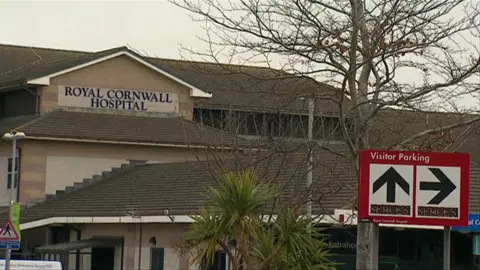Troubled Royal Cornwall Hospital 'fails to improve'
 BBC
BBCAn unannounced inspection of the Royal Cornwall Hospital has revealed services have not improved since last year.
The Care Quality Commission said there had been "little sign of real improvement" and Cornwall deserved a "better service".
In January 2016, it found the hospital to be inadequate.
Kathy Byrne, chief executive for the trust, said the inspection took place on "difficult days" for the hospital and improvements had been made.
The commission said it was "well are of the demands on the service", but found too many patients were waiting to be diagnosed, treated, admitted or discharged.

Analysis by BBC Health Correspondent Jenny Walrond

The Royal Cornwall Hospital has had a series of chairmen and chief executives in recent years. Former chairman Jon Andrewes was jailed in March for lying about his qualifications. The Care Quality Commission thinks this instability is impacting on both patients and staff.
Some of the issues raised in this report will come as no surprise to many people. The hospital has one of the highest levels of delayed transfers of care, also known as bed blocking. The emergency department has been struggling with numbers coming through its doors for some time.
While the hospital bosses come in for criticism, yet again there is concern raised about how well the wider health community is supporting the hospital. This highlights the pressure the entire system is under, because those other services, such as GPs and adult social care, are also struggling with demand.

Chief inspector, Professor Sir Mike Richards, said: "The people of Cornwall are entitled to a better service. Such are my concerns that we will be returning to the trust in July to carry out a full inspection of all core services. We will decide then what further action we must take to ensure that services improve."
He said the lack of progress in addressing the issues in their previous report "raised questions about the capacity of the trust leadership team" and there was evidence that a "prolonged period of instability at board level" had affected patient care and staff morale.
Ms Byrne said: "The unannounced inspection in January took place on two of the most difficult days for our services with demand throughout the trust at the most extreme levels, but it is right that we confront the issues raised in this report.
"I am pleased that our urgent and emergency care service has improved their CQC ratings and shown their professionalism under pressure. Other parts of the report are disappointing reading and does not reflect well on our general medical service who I know to be dedicated and caring."
